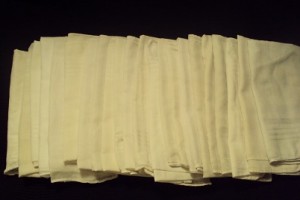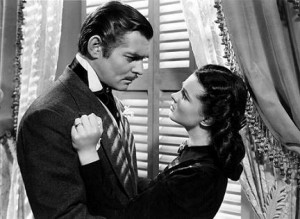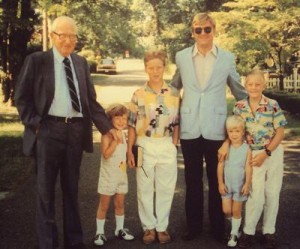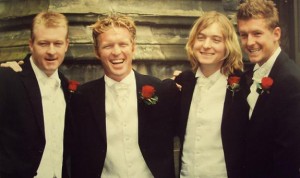Rhett Butler was never without a handkerchief when Scarlett needed one, because he was a classy guy. Having a ready hankie was the mark of a true gentleman.
Nate was a gentleman, too.
I can’t count the times I needed his hankie-help when we were away from home. Coffee spills, make-up gone awry, tears at a funeral or sticky fingers. The uses were endless. His hankie was usually out of his suit pocket before I’d looked up from my sudden need, and he never gave a thought to the fact that he might want it later himself and find it soiled by his wife.
I can remember watching my mother put a handkerchief in her purse each time she went out, noticing that my father had one, too. People of that generation didn’t use Kleenex with abandon like I do. They were “thinking green” well before it was the thing to do.
I also recall shopping with Mom to buy a bridal shower gift. She selected a handkerchief made of gauzy white linen fanned out in a square flat box and wrapped in tissue. The embroidered pink roses on one corner were matched by a pink edging all around. As a young girl I knew the bride would love it and wondered if she might even carry it on her wedding day.
When we were cleaning out Mom’s drawers after she died, she had quite a collection of beautiful hankies. But short of using them in an art project, we didn’t know what to do with them. Times had changed. Although I remember every elderly auntie tucking a handkerchief in her dress sleeve with the decorative part showing, today’s women were different. And Mom’s hankie supply went to Good Will.
I can see how hankies are wonderful for mopping up moisture — from eyes, noses, clothes, children’s faces and unnumbered other places. And life is fraught with messes that need this kind of attention. Although I’ve never owned my own hankie, I was delighted to be married to a handkerchief-carrying gentleman. I needed him, and I needed his hankies. Both helped me clean up many a mess.
 Sometimes I think about the Lord and his expertise at cleaning up after us. Throughout the Bible he mopped up a variety of disasters, and he’s in the same business today, offering his services to those of us who keep messing up. And the best part about his cleaning is that it isn’t just surface work. What he offers goes deep into the heart and fixes up what cannot be touched with a hankie but is far more difficult to clean. It’s the buried soil of sin.
Sometimes I think about the Lord and his expertise at cleaning up after us. Throughout the Bible he mopped up a variety of disasters, and he’s in the same business today, offering his services to those of us who keep messing up. And the best part about his cleaning is that it isn’t just surface work. What he offers goes deep into the heart and fixes up what cannot be touched with a hankie but is far more difficult to clean. It’s the buried soil of sin.
But the beauty of God’s mess-mopping is that once things have been cleaned up, he’s willing to let the past stay in the past. Although I don’t think God actually forgets anything, he does promise not to keep bringing up the messes we’ve made. They’re as good as forgotten.
I still remember quite a few of the wet clean-ups Nate’s hankies helped me with, and many of the handkerchiefs show stains to testify of their histories. Actually, now that I’m thinking about it, Nate never brought these things up to me again either. Like Rhett Butler, he was just happy he could help.
” ‘Come now, let’s settle this,’ says the Lord. ‘Though your sins are like scarlet, I will make them as white as snow.’ “ (Isaiah 1:18a)




